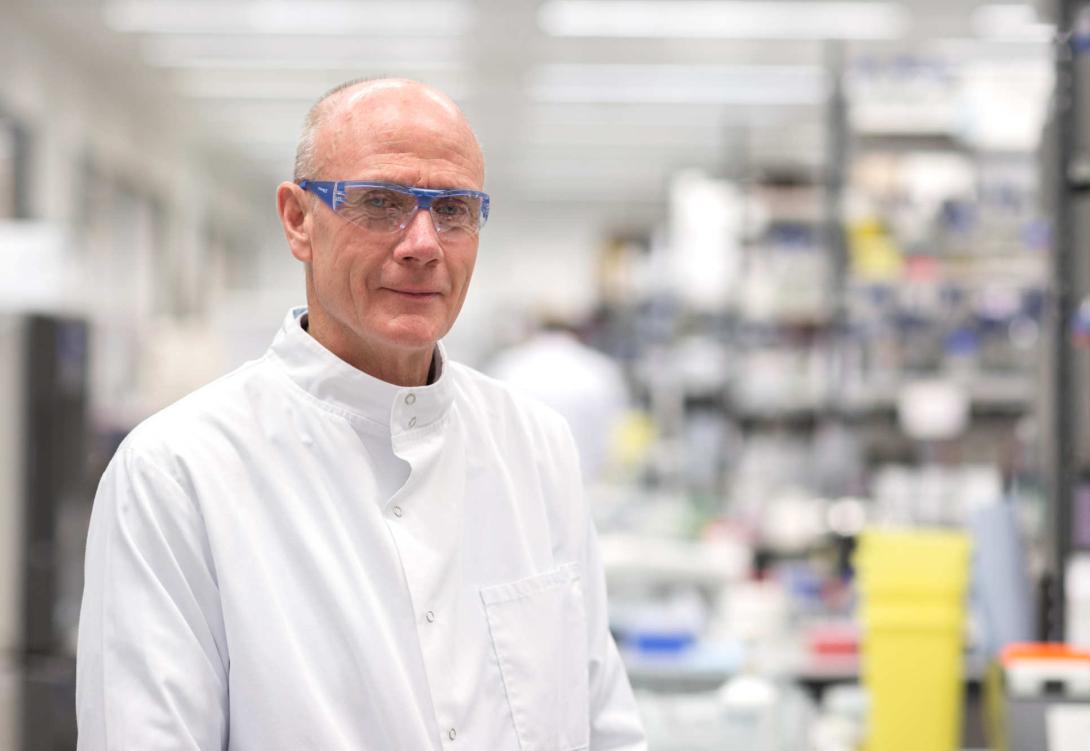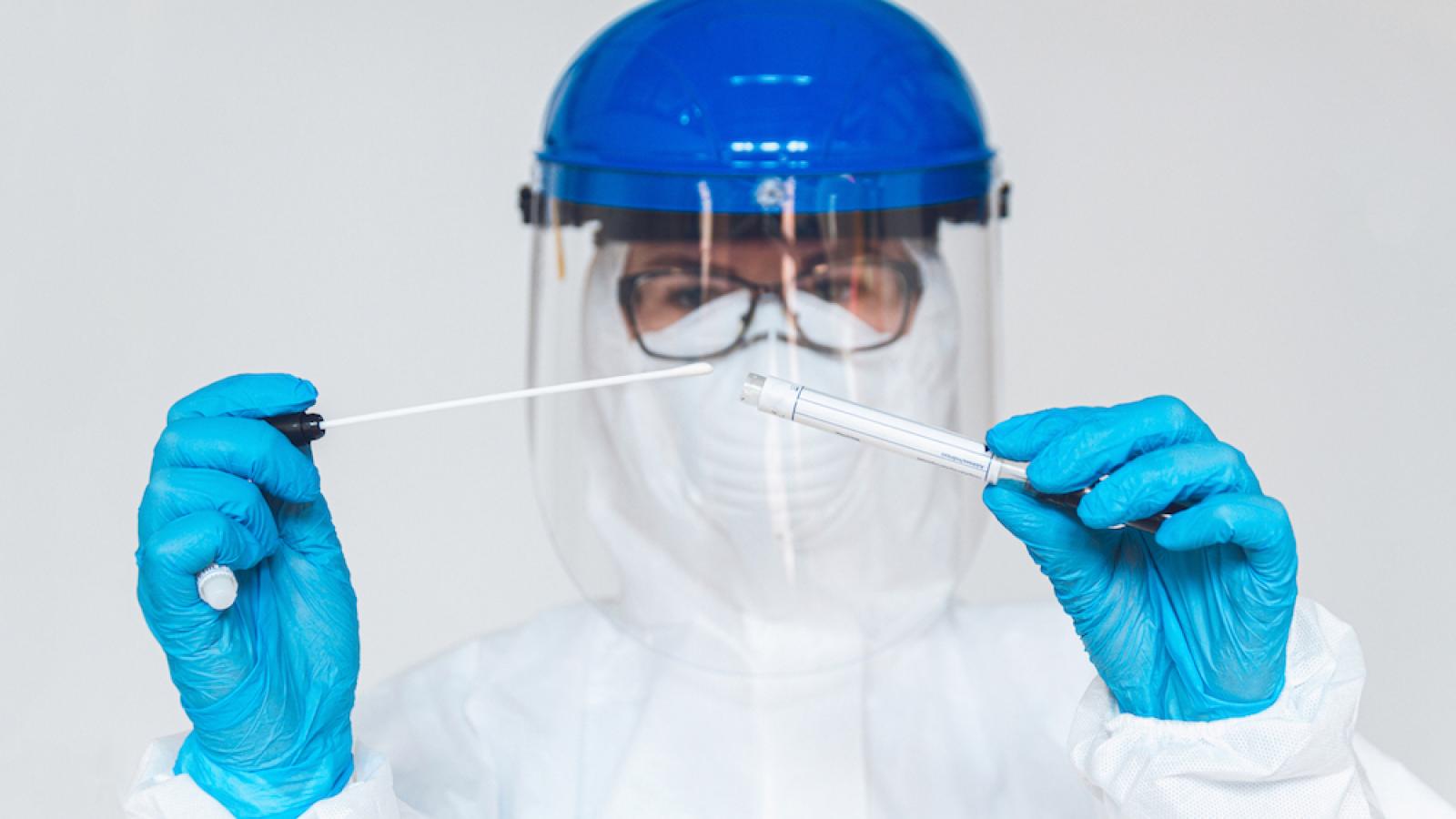A robotic testing platform developed in just nine days by UK DRI researchers could substantially increase the UK’s capacity to test people for coronavirus.
Prof Paul Freemont and colleagues from the UK DRI Care Research & Technology centre developed the platform by repurposing high-throughput, robotic technology usually used to test for infections in vulnerable people such as those living with dementia.
Identifying and tracking the spread of virus will be a critical factor in efforts to slow the outbreak. Currently, around 10,000 tests for coronavirus are being done each day in the UK, with the government aiming to increase this to 100,000 per day by the end of April.
Each of the robotic modules developed has the capability to process almost 1,000 coronavirus samples in a 12-hour period. The system employs the same test being used by the NHS, but is able to process many more samples at once and, unlike other systems, can use a range of different reagents. The platform is being accredited and approved, and last week began testing samples at two NHS hospitals in London, which have one robotic module each. Having successfully completed validation on 251 real-life samples in blind testing, the platform began testing patient samples yesterday (6 April). It is now ready to be rolled out on a much larger scale, for which the UK DRI is now looking for support.
tests can be performed in a 12-hour period on each robotic module
I am fortunate to be surrounded by an amazing team and it’s astonishing what they have been able to achieve in less than two weeks.Prof Paul FreemontGroup Leader at the UK DRI’s Care Research and Technology Centre at Imperial College London and University of Surrey
Current tests being used for coronavirus take samples from patients and amplify tiny amounts of virus RNA if they are present, in a process known as a Polymerase Chain Reaction (PCR). Following a UK government call for means to increase the number of tests that can be performed, Prof Freemont and the London Biofoundry facility which he co-directs set about repurposing their robotic RNA extraction equipment to significantly scale up this process and contribute to the needs of the UK. When he approached the UK DRI Directors with his idea, they immediately recognised its potential and put substantial financial and personnel resources behind it.
Unlike the vast majority of testing equipment worldwide, the new platform is not reliant on specific reagent suppliers. This means it is more resilient, as different test kits can be used on the same platform.
Prof Paul Freemont, Group Leader at the UK DRI’s Care Research and Technology Centre at Imperial College London and University of Surrey, said:
“This whole project was about mobilising people, equipment and expertise to contribute to efforts to combat the virus. I am fortunate to be surrounded by an amazing team and it’s astonishing what they have been able to achieve in less than two weeks. Importantly, we were talking to NHS professionals on the front line from the very start. We began by asking them how we could help and were led by them throughout the whole process.
Getting a platform like this up and running isn’t straightforward – there are a lot of things to account for that could be the difference between success and failure, like the reliability of supply chains for sample kits, reagents and other essential equipment. We have been diversifying and stress-testing a range of supply lines to make sure our platform can be used to its fullest capacity.
Importantly, working with Myra McClure’s Molecular Diagnostic Unit on the St. Mary’s Campus of Imperial College, and Paul Randell from North West London Pathology, we were able to validate the whole process from receipt of clinical samples in their containment facility to the final virus ‘detected’ or ‘not detected’ result.
The great thing about a modular platform is that it can be easily scaled up and put to use in more sites. It takes little space and needs only one trained person to operate it, meaning social distancing isn’t an issue.”
<p>days to repurpose and validate technology from the team working with Prof Paul Freemont</p>

led the team in developing the robotic platform
(image courtesy of Imperial College London)
As in other sectors, universities across the world have had to reduce or stop all research not directly addressing the coronavirus outbreak. Many scientists and clinicians are eager to lend their expertise and resources to efforts to combat the virus, and new innovative and creative solutions are springing up.
Prof David Sharp, Director of the UK DRI’s Care Research & Technology Centre at Imperial College London and University of Surrey, said:
“This is a great example of the innovative technology we are developing in the Care Research & Technology Centre being flexibly applied to the most pressing challenge facing our health service. We know that older people – including those with dementia – are disproportionately affected by COVID-19. The availability of rapid testing will be critical to reducing the impact of the virus in the months to come.”
Prof Bart De Strooper, Director of the UK DRI, said:
“I am extremely proud of the response from the research community to this crisis, both from the UK Dementia Research Institute and from others worldwide. It is testament to the versatility and positive mentality of researchers everywhere.
We quickly recognised the potential of this project to add significant value to current efforts to tackle the coronavirus outbreak and were eager to free up the necessary funds and personnel to see it through.
Many of us have been extremely frustrated and disappointed to see hard work and precious samples lost as we halt important experiments in the lab. It is heartening to see so many turning their attention and energy to help with this immediate and pressing issue.”
Article published: 7 April 2020
